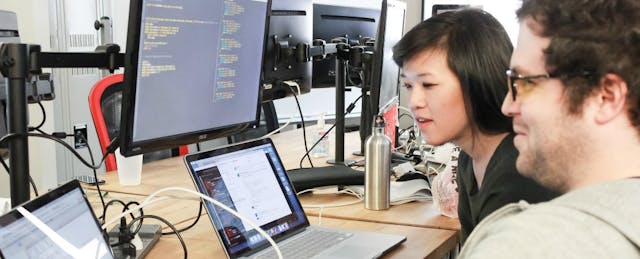Coding bootcamps aim to play a key role in closing the skills gap between the talent companies need and the competencies workers have. In most cases, these bootcamps have so far limited their roles to providing students with technical skills necessary to land higher-paying jobs. Fullstack Academy, the New York-based coding bootcamp, announced today it will go a step further by introducing the “Fullstack Fund,” an investment arm to support its graduates who launch startups.
“We constantly see great people come through our program—people with amazing academic backgrounds, super hard-working and intelligent—who in the beginning say they want to do their own thing someday,’” says David Yang, Fullstack Academy CEO and co-founder. But by the end of the program, many students decide to put their new skills to work at established companies, and their entrepreneurial ideas move to the backburner. “We just want to say, ‘We believe in you; we believe entrepreneurship is one of the great things that people can do; and your cost of doing it only gets higher as you wait.”
Fullstack Fund is modeled closely after Y Combinator’s Fellowship Program, which provides early-stage entrepreneurs with $20,000 and mentorship over eight weeks to work full-time on their projects. Yang and co-founder Nimit Maru are familiar with Y Combinator’s model; they launched their company as part of the accelerator’s cohort in 2013.
“YC started its fellowship program as an experiment, and it has proven to be a great way to fund very early-stage startups,” Maru said in a press release. “We’re launching Fullstack Fund as an experiment as well, and funding it ourselves initially, but we plan to open it up to outside investors before the end of the year.” Fullstack Academy expects to eventually grow the fund to $10 million and to make larger investments.
For now, the Fullstack Fund will provide teams with $20,000 in seed capital, a co-working space in Fullstack Academy’s New York City campus and mentorship in areas including product design and growth strategy. Like YC, the Fund will take 1.5 percent equity in a convertible note. Each admitted company—Fullstack has opened a separate application process and hopes to back four to eight companies—will have eight weeks on the New York City campus, after which each startup is expected to secure additional rounds of funding or bootstrap its growth.
To be eligible to apply, a team must have at least two alumni of Fullstack Academy network schools—Fullstack Academy, Starter League and the all-female Grace Hopper Academy—or their YC partner school, the Recurse Center. Teams generally should include two to four people who are working on ideas in consumer web and mobile software, though the fund notes it may make exceptions to these criteria. Teams can’t have already taken money from other investors.
What makes this opportunity attractive to Yang? “The YC application process is you apply to YC and you go interview for 10 minutes. We spend three months with these students. We see how they work together, we see their code quality, their thought process quality, their ideation quality. At the end of that we can say to them, ‘We think you can go further.’ This is a way to put our money where our mouth is.”


